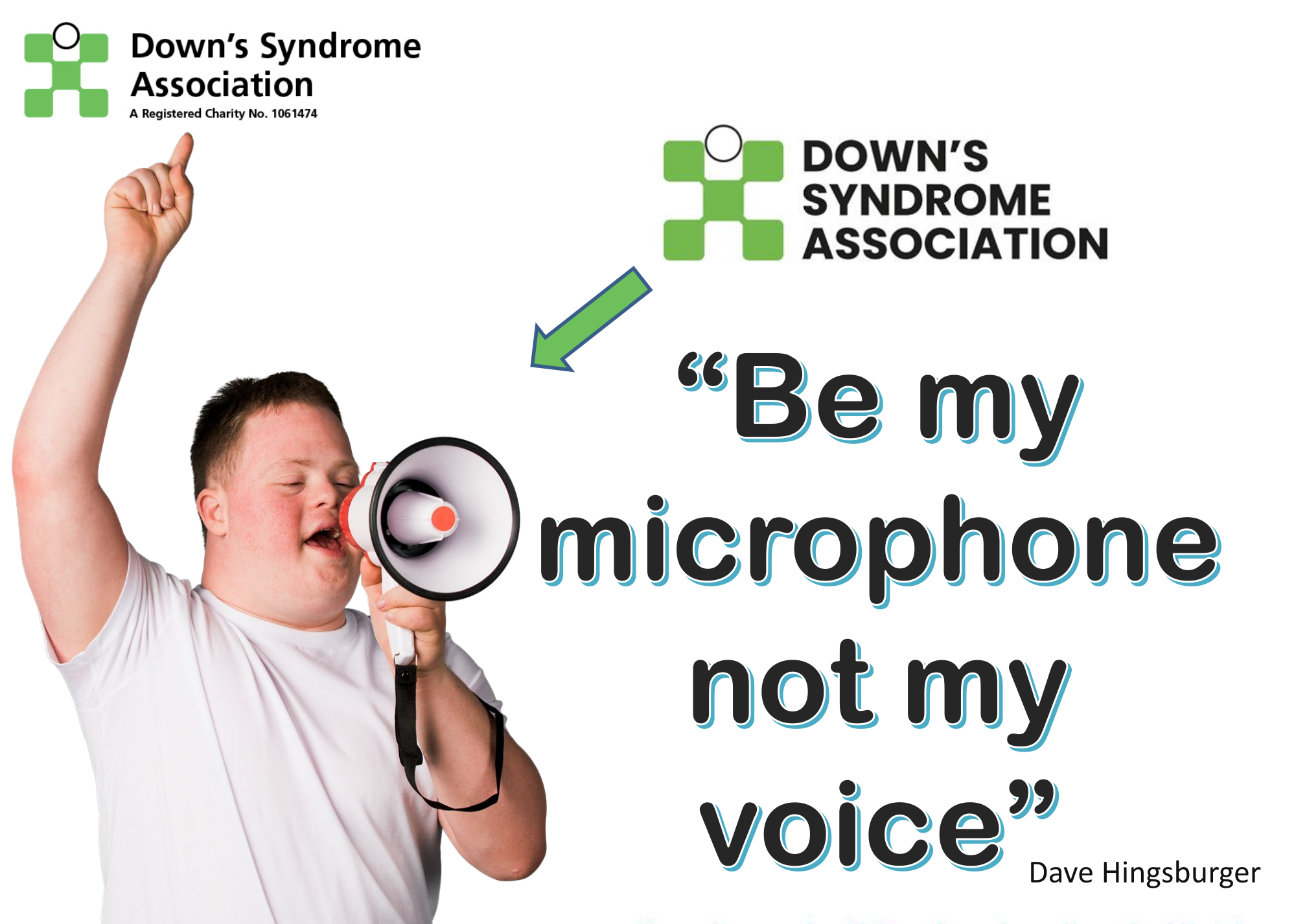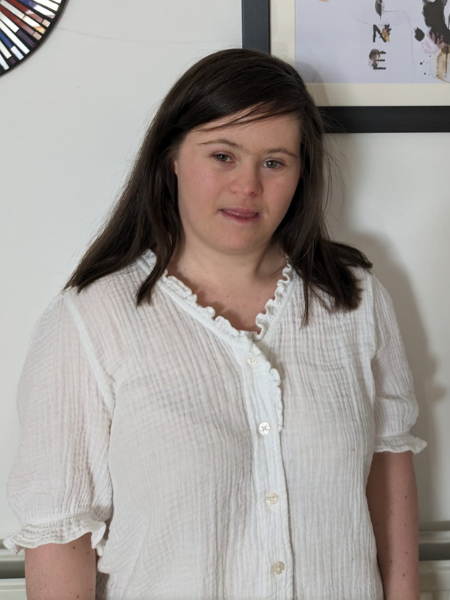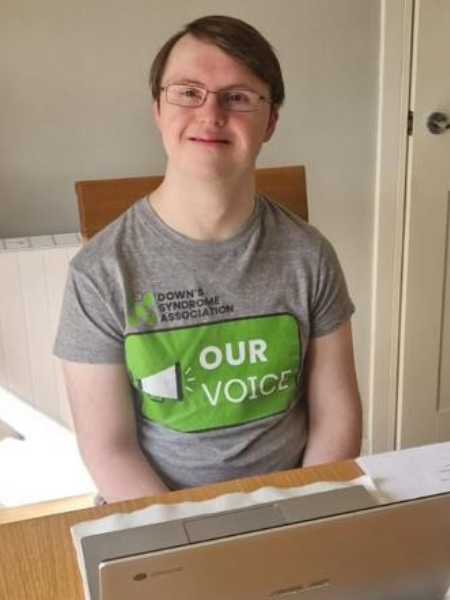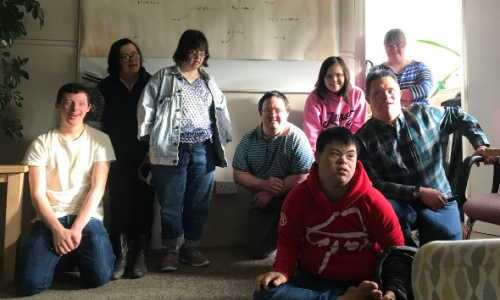Inclusive Participation
What is inclusive participation?
Inclusive participation is about everyone being able to take part in the work and activities of organisations. It means everyone’s voice is listened to and that decisions are made with people rather than for them.
We include people who have Down’s syndrome in all aspects of our work and they tell us what is important to them.
The Down’s Syndrome Association is here to amplify the voices of people who have Down’s syndrome by working together.

Listen Include Respect UK, Down’s Syndrome Association
In July 2023, two new employees started work at the Down’s Syndrome Association.
Catherine and Joe both have Down’s syndrome and are our new Inclusion Advisors.
People who have learning disabilities are excluded from policy-making processes due to inaccessible meetings, consultations and information.
The DSA and Down Syndrome International are working together on a new and innovative project based on Listen, Include, Respect (LIR) – internationally recognised guidelines for including people who have learning disabilities.
Many organisations have already begun to implement LIR guidance in their work, including the United Nations.
Our Inclusion Advisors are being trained on the LIR guidelines and will develop a UK-specific training package.
They will use this to support government departments and linked external agencies to transform processes to make sure they are accessible and inclusive.
Their practical guidance will cover Easy Read information, good support, and how to make meetings inclusive.
Let’s meet Catherine and Joe
Hi, I’m Catherine and I live in Norfolk.
Before I found Our Voice I often watched the news, Question Time and Prime Minister’s Questions about what is going on in politics. I have strong opinions on making the world a better place to be for people who have Down’s syndrome. During lockdown I was looking for something that I wanted to do and all I found was Our Voice, so I started working with them in 2020.
This is something that I want to do because this is my voice to change the world.
I like being social and being with my friends. My passion is dancing; I like contemporary, ballet, musical theatre, and tap dance. I do a lot of different dance styles. I have some performances coming up, for example at my local theatre. Because I’m a dancer, I love watching Strictly Come Dancing.
Before I came to the DSA I volunteered in various places. An Oxfam shop, a café in a conference centre, and Notcutt’s Garden Centre. Most recently, I have been helping at Able2B, an inclusive gym. I clean the equipment and mirrors and help support the clients, who all have disabilities. It’s amazing because it’s inclusive to all different abilities, like cerebral palsy, autistic people and learning disabilities. There are people of all ages, from children to older people. They work with schools as well.
When it comes to my new role, I didn’t see this opportunity coming and I felt amazed. After I got used to the idea I felt good about it, because I can make a change and stand up for all people who have Down’s syndrome.

Hi, I’m Joe and I live in Yorkshire.
I have a fierce love of performing and the creative arts – the whole spectrum including movies, musicals and music itself. I love physical theatre dance!
At college I became a student representative to campaign for inclusive education and help everyone have a better time. Since then I’ve taken on other leadership roles because I’m really compassionate about making a positive difference for all who need it. These gave me experience of work meetings.
When I was younger I came to learn quite a bit about what it means to represent your own community in different ways, from women’s empowerment to nature and wildlife, and people of different personalities and walks of life.
My favourite wildlife lives in the ocean, especially killer whales, or orcas. They have been misrepresented because of their name, they can actually be really friendly. I have been inspired by movies such as Free Willy and The Little Mermaid, which have caused me to want to focus on conservation. I have adopted a whale who lives in OrcaLab in the Johnstone Strait in Vancouver, Canada.
I joined Our Voice with the DSA in 2020. I love having an open mind and I’m excited to use this to make a positive difference in my new role as an Inclusion Advisor.

Co-production
We believe the best ways for people to participate is by creating things; and making decisions together.
People who have Down’s syndrome are involved in the planning and delivery of services, decision making at all levels of the organisation and evaluating our activities.
We do this by following the principles of co-production and by working closely with external organisations.
The principles are:
- Equality: Everyone has assets.
We believe everyone has skills to offer and no one is more important than anyone else. - Diversity: We want to hear from everybody.
We spend extra time making sure we have the voices of many. - Accessibility: Making everything accessible makes it possible for everyone to participate.
There should not be anything stopping someone joining in with our work. - Reciprocity: This means someone getting something out for putting something in.
Projects we work on together
Many of our coproduction activities are done through the DSA team ‘Our Voice’ which is made up of over 100 people who have Down’s syndrome.
Training
People with Down’s syndrome help us in the design and delivery of training.
Research
We work closely with Universities and researchers around the UK.
Weekly Check-In
We meet online with group members at least twice a week to connect with each other and work on projects.
Resources
We work together to make accessible resources.
The Our Voice team create videos, social media posts and all kinds of communications.
Consultations
The group work as consultants on various projects including the listen include respect international guidelines for inclusive participation.
Interviews
There is a series of interviews hosted by members of ‘Our Voice’ speaking to all kinds of interesting people, including Mr Motivator!
Events
Many online events have been hosted and there are many more to come.
‘Our Voice’ is a team of people who have Down’s syndrome.
They work on projects and tell the DSA what they think about the work we do.
At the DSA we create an inclusive environment where everyone can participate and contribute towards our work.
SELF ADVOCACY
Self-advocacy is the ability to speak-up for yourself and the things that are important to you. Self-advocacy means you are able to ask for what you need and want and tell people about your thoughts and feelings. Self-advocacy means you know your rights and responsibilities, you speak-up for your rights, and you are able to make choices and decisions that affect your life. The goal of self-advocacy is for you to decide what you want then develop and carry out a plan to help you get it. It does not mean you can’t get help if you need or want it, it just means that you are making the choices and you have to be responsible for the choices you make.
When you have good self-advocacy skills you can have more control and make the life decisions that are best for you. Self-advocacy helps to empower you, to speak-up for yourself and make decisions about your life.
People with Down’s syndrome may need the support of advocates to become effective self-advocates.
The Down’s Syndrome Association works with self-advocates with Down’s syndrome to learn about their lives and determine the best way to offer them support.

